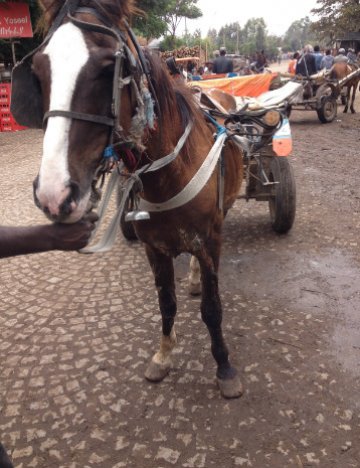International collaboration to research effect of EZL on equines and owners in Sub-Saharan Africa
A new five-year, multi-agency project is set to study new ways to tackle the widespread and debilitating disease Epizootic Lymphangitis (EZL) that has a significant impact on horses, donkeys, mules and human livelihoods in Sub-Saharan Africa.
The project, linking Brooke, The University of Liverpool, SPANA (the Society for the Protection of Animals Abroad) and the Gambia Horse and Donkey Trust, will involve large-scale field research in Ethiopia, The Gambia and Senegal.
EZL is a highly contagious fungal infection that primarily affects horses but also donkeys and mules. Symptoms normally include skin nodules and abscesses along the neck and limbs that can erupt and discharge a thick yellow pus. This causes swelling and lameness, swollen glands and in some cases eye and respiratory disease.
The disease spreads easily when a vulnerable animal contacts other infected animals or equipment. Although humans are not at risk of contracting the infection, the impact of a family’s equine becoming ill can be catastrophic.

The majority of horses, donkeys and mules in the Sub-Saharan region are relied upon for working purposes. If illness stops them from carrying loads or pulling carts for agriculture or transport purposes, this can have a major effect on a dependent family’s income.
While Britain has been free of EZL since 1906, the infection is still significantly impacting the lives of equines and dependent owners in low and middle-income countries in Sub-Saharan Africa.
Funding for this programme was awarded by the Wellcome Trust to the University of Liverpool in 2017, and Brooke and SPANA field staff are part of an international team that will be co-ordinating sampling, diagnosing and treating cases in Ethiopia and Senegal.
The national Department of Livestock Services, Gambia and The Gambian Horse and Donkey Trust are co-ordinating the research programme in The Gambia. It is hoped that by working together across organisations, the project will have the capacity to gain a much better understanding of the disease. This aims to have a positive and far reaching benefit for reducing the impact of this disease on local communities, and in supporting regional clinics and laboratories to develop practical strategies for prevention and treatment.
Other organisations contributing expertise and facilities to the project include the National Veterinary Institute Ethiopia, the College of Veterinary Medicine and Agriculture Ethiopia, Addis Ababa University, the Histoplasmosis laboratory at Ohio State University, and the Global health group at North Carolina State University.
Brooke has operated in Sub-Saharan Africa since 2001, when it began funding programmes in Kenya. Since then, the charity has expanded its work to Ethiopia, Senegal and Burkina Faso. An estimated 13 million equines are currently working across these countries, providing invaluable support to millions of families. Brooke’s mission is to relieve their immediate suffering and create lasting change by working with communities, governments and policy makers.
SPANA provides free veterinary treatment to working animals in developing countries around the world and operates extensively across Sub-Saharan Africa. The charity began working in Ethiopia in 2002, and has been acting to control the spread of EZL in the country, by treating infected animals, using preventative strategies, and providing education to owners and local vets. Last year, the charity provided more than 11,000 treatments to working animals in Ethiopia.
The Gambia Horse and Donkey Trust has two veterinary centres and operates mobile veterinary clinics that provide health care and support for working equines. It aims to provide Gambians with the skills and training to address the problems that are encountered with their working equines through training and capacity building.
